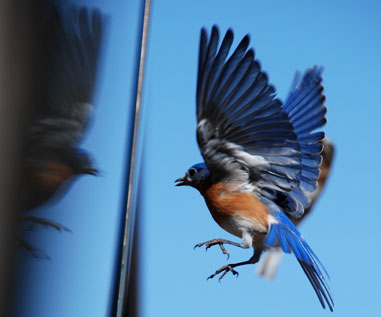
As a participant in a recent panel discussion on innovation, I listened as a veteran innovation manager explained that she wanted people on her team who were persistent, who didn’t give up when faced with obstacles and setbacks. Really? As innovators, do we want people who won’t take “No” for an answer? Or, do we want people who pick up on the “No’s” quickly and adjust their thinking to find a creative work around? The first approach is persistence. The second still reflects determination, but in a way that’s more flexible. Isn’t a willingness to experiment and then keep trying when we fail the attribute we need, rather than raw persistence? I couldn’t resist taking issue with her comment and she quickly acknowledged the distinction. I grinned and told her I knew that she knew what she really meant. Still, she was making a common observation that is easily misconstrued.
So, back to my little blue buddy. I don’t want to insult anyone’s intelligence by suggesting that you’re no smarter than that determined little blue bird. So let me just say that he was showing some remarkably human behaviors. He recognizes a problem, and he knows the solution, so he’s very persistent about implementing that solution…even when it’s not solving the problem. The story in his head tells him he’s facing a threat that must be eliminated, and he devotes a remarkable amount of effort to doing just that, failing to realize that devotion to the cause isn’t what’s needed. To that hapless little bird, it looks like a problem he’s dealt with many times before. But that counts for little because this time the problem itself is an illusion. The threat exists only in his (aching) head.
With each repeated attempt, he seemed to get more determined, apparently thinking, “How many times do I have to do this? Not again! Doesn’t that guy get it? I must really need to make a point!” The more upset he got, the more stress I suspect he felt, and the less likely he was to find the insight needed to overcome his own misperceptions. How willingly he blamed his imaginary nemesis (i.e. co-worker, customer, boss…) for being the problem when his pain and anxiety is entirely self-inflicted. Yes, how very human!
I doubt that anyone would point to bluebirds as a model for innovation. They haven’t evolved much in eons. They’ve been out-competed by invasive species, and left homeless by the logging of old growth trees. Decaying trees provide the cavities blue birds insist on for their nests. So, without the human intervention of providing them with little blue bird houses, they would indeed be quite rare, if they survived at all. Yet those external factors would not be nearly as damaging if it weren’t for their own ingrained behaviors.
My little friend’s persistence continued for months. Many times a day I would hear what became the very recognizable sound of bird hitting glass, and see my frustrated companion perched at the window staring down his adversary. Waving the poor thing away was only a momentary solution. Apparently my leadership and communication skills just weren’t up to the challenge of helping him see the error in his ways…a problem I’ve had before although not with bluebirds.
There are times when persistence can be a very admirable quality, but it rarely leads to success, much less innovation, unless we’re exploring multiple options and willing to rethink our assumptions. It’s those later qualities that most define an innovator.
Get the new Special Report, Innovation Essentials: The Four Greatest Ways We Stop Ourselves…In Business and in Life. Download a free copy at: http://www.insightfusion.com/SpecialReport.asp

Leave A Comment